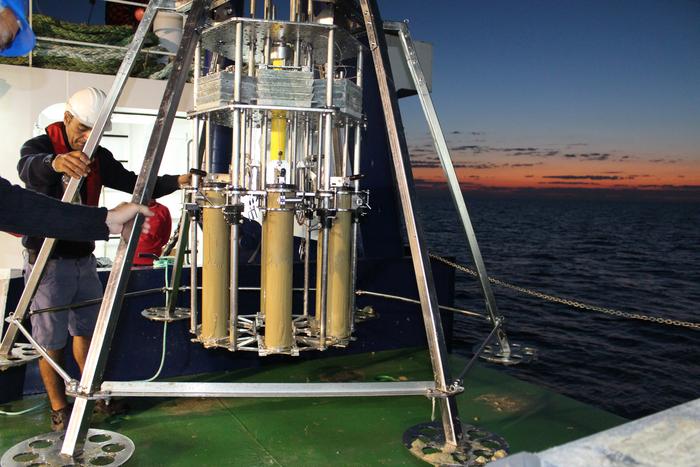The acidification of the oceans caused by human activity is already altering the production of marine plankton shells in the Mediterranean Sea. This is the worrying conclusion of a study led by the Institute of Environmental Science and Technology of the Universitat Autònoma de Barcelona (ICTA-UAB), which alerts of the impact the decrease in pH of the surface ocean has on the production of calcium carbonate by marine plankton, with negative consequences for marine ecosystems.

Credit: Photo: ICTA-UAB
The acidification of the oceans caused by human activity is already altering the production of marine plankton shells in the Mediterranean Sea. This is the worrying conclusion of a study led by the Institute of Environmental Science and Technology of the Universitat Autònoma de Barcelona (ICTA-UAB), which alerts of the impact the decrease in pH of the surface ocean has on the production of calcium carbonate by marine plankton, with negative consequences for marine ecosystems.
Anthropogenic carbon dioxide (CO2) emissions have increased alarmingly in recent decades. Since the Industrial Revolution, about 25% of anthropogenic CO2 has entered the ocean, changing water chemistry and lowering pH, a phenomenon known as ocean acidification.
The study, carried out in collaboration with researchers from the University of St Andrews (UK), the Max Planck Institute of Chemistry (MPIC) in Mainz (Germany) and the Spanish Council for Scientific Research (CSIC) in Barcelona (Spain) and published in the Nature Portfolio journal Communications Earth & Environment, assessed the impact of CO2 -induced changes in the Mediterranean Sea on foraminifera, a particular group of calcifying planktonic organisms.
To do this, they studied records from different Mediterranean sites: the Alboran Sea, off the coast of Barcelona, and the Strait of Sicily, spanning the past two thousand years. The researchers chose to study the western Mediterranean Sea because it is a region particularly affected by anthropogenic pressures and climate change. Due to the high alkalinity and the fast circulation of water masses in the basin, Mediterranean waters are susceptible to the uptake of anthropogenic carbon, which has led to a pH drop of 0.08 units since the Industrial Revolution, affecting the biogenic calcification of marine plankton.
Foraminifera are a common type of marine calcifying zooplankton that live in the upper ocean and are very sensitive to climatic and environmental changes. These single-celled organisms build a shell, several hundred micrometers in size, which is made of calcium carbonate. Albeit the shell’s extreme robustness, these calcite structures are highly sensitive to changes in seawater chemistry, which makes them an ideal tool for studying the long-term impacts of carbon perturbations on marine ecosystems. This is reflected in an accelerated decrease in shell weight during the 20th century. In contrast, before the Industrial Revolution, the shells of planktonic foraminifera were heavier without showing much variability in weight over time. The study also shows that the anthropogenic carbon dioxide signature has already been transferred to the shell chemistry of the planktonic calcifiers” explains Sven Pallacks, lead researcher of the study.
The researchers found that ocean acidification caused by anthropogenic emissions is the main driver of the decline in foraminiferal calcite mass, while ocean warming may be mitigating this effect.
“This demonstrates the basin-wide change in marine calcite production under increased atmospheric CO2 concentrations and acidification of surface waters in the Mediterranean Sea,” explains Patrizia Ziveri, oceanographer at ICTA-UAB.
By reconstructing the records, the researchers were able to assess the impact of acidification on the calcification of planktonic foraminifera. The results can also be applied to other calcifying planktic organisms living in Mediterranean surface waters, such as coccolithophores or pteropods, which play an important role in the modulations of atmospheric CO2.
The results indicate that anthropogenic ocean acidification at the Mediterranean Sea surface has affected foraminiferal calcification during the 20th century. As calcifying plankton are an important component of both the marine food web architecture and biogeochemical cycles, continued ocean acidification would have a negative impact on marine ecosystem services, including climate regulation, ocean’s ecosystem functioning and food security, reiterating the importance of mitigating climate change by drastically reducing CO2 emissions.
Journal
Communications Earth & Environment
DOI
10.1038/s43247-023-00947-7
Method of Research
Experimental study
Subject of Research
Not applicable
Article Title
Anthropogenic acidification of surface waters drives decreased biogenic calcification in the Mediterranean Sea
Article Publication Date
28-Aug-2023




